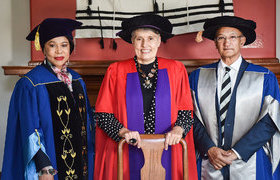Ouma Katrina Esau: Reviving a language, one child at a time
31 March 2023 | Story Nadia Krige. Photos Lerato Maduna. Voice Cwenga Koyana Read time 6 min.
Earlier this week, the University of Cape Town (UCT) bestowed an honorary doctorate on Her Excellency ǂXuu Katrina Esau. Affectionately known as Ouma Katrina, the nonagenarian is the last remaining fluent speaker of the critically endangered N|uu language and one of South Africa’s living legends.
Thought to be extinct until fairly recently, N|uu – an ancient San language from the Tuu family – re-emerged in the Northern Cape during the late 1990s when people who were able to speak the language fluently were encouraged to contribute to its survival and revival.
At the time, there was a group of about 20 older people who could speak the language fluently, among them Ouma Katrina and her siblings. Sadly, Ouma Katrina is the last of the group still alive.
She has, however, made it her life’s mission to preserve the language for the future by educating young people from her community in a tiny classroom at her house in Rosedale, outside Upington in the Northern Cape.
“Who would have thought that a woman who never saw the inside of a school, who looked after sheep and cleaned kitchens on her hands and knees, would be here today?”
“There were only 20 of us who could speak the language and when no one else wanted to teach it to others, I decided that I would,” said Ouma Katrina.
Her granddaughter, Claudia Snyman, is one of her keenest protégés and co-authored Qhoi n|a Tijho (Tortoise and Ostrich), a N|uu children’s book, with her grandmother in 2021.
“Who would have thought that a woman who never saw the inside of a school, who looked after sheep and cleaned kitchens on her hands and knees, would be here today?” said an emotional Ouma Katrina (90), with Snyman by her side, during a special ceremony held in the Centre for African Studies Gallery on upper campus.
“Thank you, UCT, for seeing your way clear to include me – an elderly woman who never learned to read.”
The event encompassed the unveiling of a N|uu-language dictionary, compiled with critical input from Ouma Katrina, as well as her capping by UCT Chancellor Dr Precious Moloi-Motsepe.
Capturing the voices of the last N|uu speakers
“The work that we built on to create this publication [the N|uu language dictionary], is actually a 25-year labour of love where we had multiple community members contributing (quite literally) their voices in audio format to the project,” said Dr Kerry Jones, the director of the African Tongue professional linguistics consultancy.
This organisation collaborates with contemporary speakers of Ju, Tuu and Khoe languages in southern Africa to produce creative and educational resources.
Apart from the hardcopy, which was unveiled during the ceremony, a digital version of the N|uu dictionary also exists, as well as the Saasi Epsi mobile app. These resources are available for free thanks to funding by the South African government’s Department of Sports, Arts and Culture.
Associate Professor Lolie Makhubu-Badenhorst, the director of the Multilingualism Education Project within UCT’s Centre for Higher Education Development (CHED), said the dictionary is an invaluable academic resource which would fill crucial gaps in research of the South African cultural landscape.
Re-emerging from centuries of suppression
In a similar vein, Dr Yvette Abrahams, the interim director of the Centre for African Studies, said it is “impossible to research a silence, to investigate an absence” and that Ouma Katrina’s achievement offers the academy an opportunity to grapple with the far-reaching effects of language suppression.
In the case of the San languages, this started in the late 1770s with the issuing of hunting permits for the elimination of San men. Simultaneously, San women, and children under the age of two were isolated and forbidden to speak their languages.
“May this event be a forerunner to the beautiful future that we are going to build.”
This suppression reached its apex during the apartheid era, when children were punished for speaking any language other than Afrikaans at school.
“So, when we honour Ouma today it is because we understand how far you have come to get here. We understand what you have gone through to preserve the language. We understand that you came from a place of such suppression that people were afraid to even talk the language in the daylight,” said Dr Abrahams. “May this event be a forerunner to the beautiful future that we are going to build.”
Including the community in research
These sentiments were echoed by Anthony Phillip Williams from Indigenous First Nation Advocacy South Africa, who appealed to researchers to ensure that the lived experiences of communities are held in high regard.
“Genocide is at the heart of why first-nation people, in our case San and Khoi people, don’t speak their languages and why these languages are almost extinct,” he said.
Williams concluded his address with an emotional appeal for the university to assist first nations in reviving their roots, cultures and traditions. “We call on UCT as the San and Khoi communities: won’t you take our hand as we navigate one of the most difficult things, because in the language, our identity is located,” he said. “Won’t you help us find ourselves?”
 This work is licensed under a Creative Commons Attribution-NoDerivatives 4.0 International License.
This work is licensed under a Creative Commons Attribution-NoDerivatives 4.0 International License.
Please view the republishing articles page for more information.


















